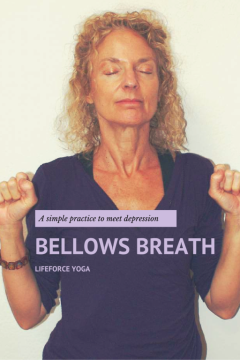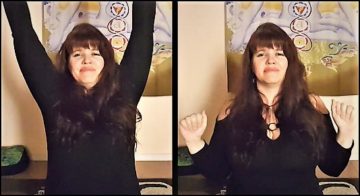
*Updated June 2018
Let’s create a little more space around the depressed mood or lethargy, with a short, safe adaption of a yoga breathing practice called bellows breath (bhastrika).
This breath is especially good for depression. The subjective experience is one of mild elation, followed by a feeling of relaxation. During practice, the sympathetic nervous system is briefly stimulated. However, following practice, the parasympathetic system is awakened. Blood pressure and heart rate usually drop to or below the resting rate, and the autonomic nervous system comes back into balance.
NOTE: Please do not practice Bellows Breath if you have un-medicated high blood pressure. If you have low blood pressure, you might feel a little light headedness afterwards, so be sure to practice in a seated position. If there is shoulder soreness or injury, practice Bellows Breath with the arms coming forward and back in front of the chest, or even opening and closing the fists.
Various yoga traditions teach Bellows Breath differently. But in all traditions, both inhalation and exhalation are deep and forceful. The breath is safest when practiced at a rate of one inhalation and one exhalation per second. Increasing the speed risks producing an over-stimulating effect that can actually raise anxiety levels. If you live with bipolar disorder 1 and have a propensity toward mania, too many stimulating practices like bellow breath can trigger a manic response.
- Sit comfortably with your spine erect. Bend your elbows and make fists with your hands, bringing fists to your shoulders so that the knuckles face out, with the forearms and upper arms hugging the torso. Take a normal natural breath in and out.

- As you inhale through the nostrils, send your arms straight up, over your head with great force, opening your palms to face outward and spreading your fingers wide.
- Exhale with great force through the nostrils as you bring your arms back to the starting position again, making fists with your hands.
- Do this at a pace of one breath per second, 10 – 20 times.
- When you have completed the practice, bring the palms open on the lap and sense the fingers of the left hand, sense the fingers of the right hand.
-

Adhi Mudra for grounding Bring the thumbs into the palms of the hands and turn the knuckles down on the knees, this is called Adhi Mudra. Take a full breath in and out. Inhale to 2/3rds capacity and sustain the breath. In this retention, experience yourself as a container of awakened energy. Listen to your body, when you need to, release the breath, release the hand gesture, and breathe normally.
- Observe the effects of the practice by sensing the left cheek, the right cheek, the lips, the arms, the left palm, and the right palm. Perhaps feeling a little lighter. Maybe there is a sense of more room inside.
- Inhale to the crown with the phrase, “I am.” Exhale to the sitting bones, “here.” Do this two more times.
Thanks for posting these clear instructions. It is so helpful to be able to refer my clients to the web site for out of session support for these practices.
You are welcome 🙂
[…] Breathe: Extending your inhale so it lasts twice as long as your exhale will energize your body. Breath in slowly, expanding through your ribs and abdomen and then exhale quickly and fully. Stretching to open the chest while inhaling, such as in Senobi breathing or bellows breath can increase the effectiveness of this technique. Pausing for a second or two between the inhale and exhale will help avoid hyperventilation. […]